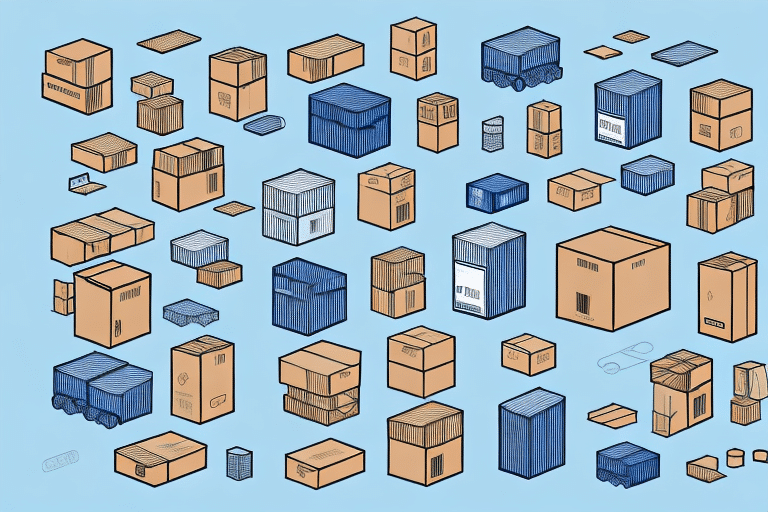3PLs From A to Z: Definitions for E-Commerce Order Fulfillment
As e-commerce continues to grow, so does the need for efficient order fulfillment. Third-party logistics (3PL) providers have become a popular solution for businesses looking to outsource their order fulfillment processes. In this comprehensive guide, we'll delve into everything you need to know about 3PLs and their role in e-commerce order fulfillment.
Understanding the Basics of Third-Party Logistics (3PLs)
Third-party logistics, or 3PL, refers to the outsourcing of logistics and supply chain management functions to a specialized provider. In the context of e-commerce, 3PLs offer services such as warehousing, inventory management, order processing, and shipping to businesses. While specific offerings may vary between providers, the core idea remains consistent: businesses entrust their logistics and supply chain operations to experts in the field.
One of the primary advantages of utilizing a 3PL provider is the potential for significant cost savings. By outsourcing logistics and supply chain functions, businesses can eliminate expenses associated with maintaining their own warehouses, hiring additional staff, and investing in transportation and technology infrastructure. Furthermore, 3PL providers often have established relationships with carriers, enabling them to negotiate more favorable shipping rates.
Additionally, 3PL providers offer unparalleled flexibility. As businesses expand and their logistics needs evolve, they can easily scale their services with a 3PL provider, allowing them to focus on their core competencies while leaving the logistics management to the experts.
How 3PLs Help E-Commerce Businesses Meet Order Fulfillment Demands
The surge in e-commerce has increased the pressure on businesses to efficiently handle order fulfillment. A growing number of orders translates to more inventory to manage, more orders to process, and more shipments to execute. This is where 3PL providers prove invaluable. By outsourcing these tasks, businesses can allocate their resources to other critical areas of operation while the 3PL handles the logistics and supply chain functions.
One of the standout benefits of partnering with a 3PL for order fulfillment is the ability to scale operations swiftly. As e-commerce businesses grow, their order volumes can spike rapidly, a challenge to manage internally. 3PL providers possess the infrastructure and resources necessary to accommodate large volumes of orders, enabling businesses to expand without the constant worry of fulfillment capacity.
Moreover, 3PL providers offer access to advanced technology and analytics. Many utilize sophisticated software to manage inventory, track shipments, and optimize supply chain operations. This technology grants businesses valuable insights into their operations, facilitating data-driven decisions and enhanced efficiency.
The Benefits of Outsourcing Order Fulfillment to a 3PL Provider
Outsourcing order fulfillment to a 3PL provider comes with multiple benefits. A key advantage is cost savings. By delegating logistics and supply chain functions, businesses can avoid the capital expenditures involved in building and maintaining their own warehouse and logistics infrastructure. Additionally, 3PL providers leverage economies of scale to negotiate better shipping rates, passing these savings on to their clients.
Another significant benefit is scalability. As businesses experience growth, their logistics and supply chain needs expand correspondingly. Outsourcing these functions to a 3PL provider allows for easier scaling without the need for additional investments in logistics infrastructure.
Furthermore, 3PL providers bring specialized expertise that businesses might lack internally. These providers are well-versed in logistics and supply chain management, possessing the knowledge and experience to optimize these processes for their clients. By outsourcing to a 3PL provider, businesses can harness this expertise without the need to develop it in-house.
Additionally, outsourcing order fulfillment to a 3PL provider can lead to improved customer service. 3PL providers have the resources and technology to ensure faster and more accurate order processing, enhancing customer satisfaction. They also offer value-added services such as gift wrapping, customized packaging, and returns management, further elevating the customer experience.
Another advantage is increased flexibility. 3PL providers offer a range of services, from basic warehousing and transportation to more complex supply chain management solutions. This allows businesses to select services that best align with their needs and adjust their logistics strategies as the business evolves. Moreover, 3PL providers can offer customized solutions for specific industries or product types, such as temperature-controlled storage for perishables or hazardous materials handling for chemicals and pharmaceuticals.
Why 3PLs are Essential for Scaling E-Commerce Operations
3PLs are crucial for e-commerce businesses aiming to scale their operations. As businesses grow and order volumes increase, so do their logistics and supply chain demands. By outsourcing these functions to a 3PL provider, businesses can scale their operations seamlessly without the need to invest heavily in additional logistics infrastructure. This scalability is vital for businesses looking to seize new growth opportunities and expand their market presence.
In addition to scalability, 3PLs offer expertise and technology that help e-commerce businesses optimize their supply chain operations. Many 3PL providers employ advanced warehouse management systems (WMS) and transportation management systems (TMS) that streamline logistics processes and enhance efficiency. Additionally, 3PL providers often possess specialized knowledge in specific industries or regions, which is invaluable for businesses aiming to penetrate new markets or diversify their product offerings.
Exploring the Different Types of 3PL Services Available for E-Commerce
E-commerce businesses can access a variety of 3PL services tailored to their specific needs. The most common services include:
- Warehousing and Fulfillment: Involves storing inventory and processing orders. This includes picking, packing, and labeling products for shipment.
- Transportation and Shipping: Focuses on the movement of goods from warehouses to customers, managing carriers, and optimizing shipping routes.
- Value-Added Services: Includes additional services such as kitting, assembly, customized packaging, and quality control.
An increasingly popular service is Reverse Logistics. This involves managing product returns from customers, which includes processing returns, refurbishing or repairing products, and responsibly disposing of unsellable items. Effective reverse logistics are essential for maintaining customer satisfaction and minimizing losses.
How to Choose the Right 3PL Provider for Your E-Commerce Business
Selecting the appropriate 3PL provider is a critical decision for your e-commerce business. Consider the following factors:
- Cost: Analyze the pricing structure, including storage fees, transaction fees, and shipping rates. Ensure that the costs align with your budget and financial projections.
- Scalability: Choose a provider that can scale their services in line with your business growth and fluctuating order volumes.
- Expertise: Evaluate the provider’s experience in the e-commerce sector and their understanding of your specific industry needs.
- Location: Proximity to your customer base can significantly impact shipping times and costs. Select a provider with strategically located warehouses.
- Technology Capabilities: Ensure the provider offers robust technology solutions, such as integration with your e-commerce platform and real-time inventory tracking. Providers like Oracle SCM or Shopify Fulfillment offer advanced integration options.
It's also essential to establish a clearly defined service level agreement (SLA) with your provider, outlining specific services, performance expectations, and key performance indicators (KPIs).
Top Considerations When Evaluating Potential 3PL Providers for Order Fulfillment
When assessing potential 3PL providers, keep the following considerations in mind:
- Experience and Reputation: Research the provider’s history, client testimonials, and case studies to gauge their reliability and quality of service.
- Technology Integration: Ensure the provider’s technology systems seamlessly integrate with your e-commerce platform for efficient order management and inventory tracking.
- Scalability: Confirm that the provider can handle your growth projections and adapt to your evolving business needs.
- Geographic Reach: If your business operates internationally, choose a provider with a strong global presence to ensure efficient delivery across regions.
- Customization and Flexibility: Opt for a provider that can tailor their services to meet your unique requirements, whether it’s specialized packaging or handling specific product types.
Additionally, consider the provider’s ability to offer transparent reporting and analytics, which are crucial for monitoring performance and making informed decisions.
Understanding the Costs Associated with Partnering with a 3PL
Partnering with a 3PL provider involves various costs that businesses should understand upfront:
- Storage Fees: Charges based on the amount of space your inventory occupies in the warehouse.
- Transaction Fees: Fees per order processed, which can include picking, packing, and handling.
- Shipping Fees: Costs associated with transporting goods to customers, which may vary based on shipping speed and distance.
- Additional Services Fees: Charges for value-added services such as assembly, custom packaging, or specialized handling.
It's crucial to factor these costs into your financial projections and work closely with your 3PL provider to identify opportunities for cost optimization and efficiency improvements.
The Role of Technology in 3PL Services and E-Commerce Order Fulfillment
Technology is a cornerstone of modern 3PL services and e-commerce order fulfillment. 3PL providers utilize advanced technologies to streamline and optimize their operations:
- Warehouse Management Systems (WMS): These systems manage inventory levels, track product locations, and optimize warehouse layouts to enhance efficiency.
- Transportation Management Systems (TMS): TMS solutions plan and execute transportation operations, including carrier selection, route optimization, and shipment tracking.
- Integration with E-Commerce Platforms: Seamless integration with platforms like Shopify or Magento ensures real-time synchronization of orders, inventory, and shipping information.
- Analytics and Reporting Tools: Provide insights into supply chain performance, helping businesses make data-driven decisions to enhance efficiency and customer satisfaction.
By leveraging these technologies, 3PL providers offer businesses real-time visibility into their inventory and order statuses, facilitating a seamless and automated order fulfillment process.
Common Challenges Faced by E-Commerce Businesses in Order Fulfillment and How 3PLs Can Help
E-commerce businesses often encounter several challenges in order fulfillment, including:
- Inventory Management: Maintaining optimal inventory levels to meet demand without overstocking.
- Order Processing: Ensuring accurate and timely processing of orders to meet customer expectations.
- Shipping Efficiency: Balancing cost and speed to provide competitive shipping options.
- Returns Management: Handling product returns efficiently to maintain customer satisfaction.
3PL providers address these challenges by offering expertise, scalable infrastructure, and advanced technology solutions. They implement efficient inventory management systems, streamline order processing workflows, and optimize shipping strategies to enhance overall fulfillment efficiency. Additionally, 3PLs manage returns effectively, ensuring products are processed promptly and customer satisfaction is maintained.
Best Practices for Working with a 3PL Provider to Optimize E-Commerce Order Fulfillment
To maximize the benefits of partnering with a 3PL provider, consider the following best practices:
- Establish Clear Communication: Maintain open lines of communication with your 3PL provider to address issues promptly and ensure alignment of goals.
- Define Service Level Agreements (SLAs): Clearly outline the expectations, performance metrics, and responsibilities of both parties to ensure accountability and transparency.
- Leverage Technology Integration: Utilize integrated systems for real-time data exchange, inventory tracking, and order management to enhance operational efficiency.
- Regularly Review Performance Metrics: Monitor key performance indicators (KPIs) such as order accuracy, fulfillment speed, and shipping costs to identify areas for improvement.
- Collaborate on Continuous Improvement: Work with your 3PL provider to implement process improvements, adopt new technologies, and optimize supply chain strategies.
By following these best practices, businesses can foster a strong partnership with their 3PL provider, leading to optimized order fulfillment and enhanced customer satisfaction.
Case Studies: Successful Partnerships between E-Commerce Companies and 3PL Providers
Numerous e-commerce businesses have successfully leveraged partnerships with 3PL providers to enhance their order fulfillment processes:
- Example 1: An online retailer outsourced their order fulfillment to a 3PL provider, enabling them to scale their operations by tenfold without investing in additional logistics infrastructure. This partnership allowed the business to focus on product development and marketing while the 3PL managed the increased order volume efficiently.
- Example 2: A startup e-commerce company partnered with a 3PL provider to reduce their shipping costs by 30%. By leveraging the provider’s established carrier relationships and bulk shipping rates, the company was able to pass the savings onto customers, enhancing competitiveness and profitability.
- Example 3: A fashion e-commerce brand collaborated with a 3PL provider to implement a sophisticated WMS and TMS, resulting in a 25% improvement in order processing speed and a significant reduction in shipping errors. This technological integration enhanced customer satisfaction and repeat business.
Emerging Trends in 3PL Services and Their Impact on E-Commerce Order Fulfillment
Staying abreast of emerging trends in 3PL services is crucial for e-commerce businesses aiming to maintain competitive advantage:
- Same-Day and Next-Day Delivery: The demand for rapid delivery options is increasing. 3PL providers are investing in advanced logistics networks and technology to offer expedited shipping services, meeting consumer expectations for swift delivery.
- Robotics and Automation: Automation in warehouses, including the use of robotics for picking and packing, is enhancing efficiency and reducing errors in order fulfillment processes.
- Artificial Intelligence and Machine Learning: AI and ML are being utilized to predict demand, optimize inventory levels, and improve route planning, leading to more efficient and cost-effective fulfillment operations.
- Green Logistics: Sustainable practices, such as using eco-friendly packaging and optimizing transportation routes to reduce carbon emissions, are becoming integral to 3PL services, aligning with the growing emphasis on environmental responsibility.
- Omnichannel Fulfillment: 3PL providers are expanding their capabilities to support omnichannel strategies, enabling seamless order fulfillment across multiple sales channels, including online stores, brick-and-mortar locations, and mobile platforms.
By embracing these trends, 3PL providers are transforming the landscape of e-commerce order fulfillment, offering businesses innovative solutions to meet evolving consumer demands and operational challenges.
Overall, 3PL providers play an essential role in e-commerce order fulfillment. By outsourcing these functions to a third-party provider, businesses can optimize their operations and focus their resources on other aspects of their business. As e-commerce continues to grow and evolve, it’s crucial for businesses to stay informed about the latest trends and best practices in 3PL services.






















